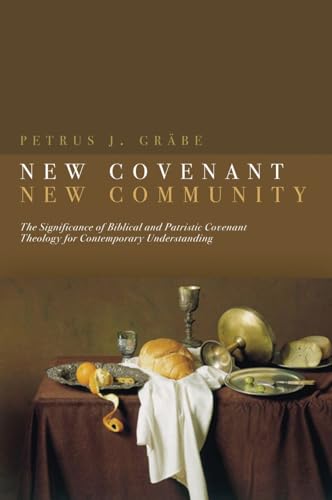NEW COVENANT, NEW COMMUNITY: THE SIGNIFICANCE OF BIBLICAL AND PATRISTIC COVENANT THEOLOGY FOR CONTEMPORARY UNDERSTANDING
Written by PETRUS J. GRÄBE Reviewed By A. T. B. McGowanThis monograph, tracing the theme of covenant through the Scriptures, is an excellent contribution to the discipline of biblical theology. First published in German, it is now made available to a wider readership. Dr Gräbe, who teaches in the USA, demonstrates a sound grasp of the available material and has clearly read widely in both English and German sources.
Dr Gräbe notes the recent ‘renaissance’ of studies in covenant theology and uses this to set the scene for a study of the use of the word ‘covenant’ both in the Jewish and early Christian periods. He begins by looking at its use in the Old Testament and interacts with a number of significant scholars who have written on the theme. He is particularly concerned to trace the concept of the ‘new covenant’ and does so in both early Jewish literature and the New Testament. His exegetical work on those passages relating to the Lord’s Supper (where the concept is most frequently found) is very helpful indeed. He then moves on to consider the theme as it is found in Paul, in the letter to the Hebrews, and in the Johannine literature, before taking the discussion forward into the early centuries of the life of the church.
It is not only his exegetical work which is helpful, however, but also his theological analysis of the material. He demonstrates an awareness not only of biblical theology but also of systematic and historical theology, and this gives depth to his work. It is also interesting to see the way in which he offers practical application of the work, not least to the issue of Christian-Jewish dialogue.
For this reviewer, with an interest in covenant theology, the most interesting element of the book was the discussion on the implications of Dr Gräbe’s exegetical insights for covenant theology. In this discussion he engages with two streams of covenant theology: the covenant theology of Karl Barth and the federal theology that is espoused in the later Reformed confessions. Whether or not one agrees with his analysis and conclusions, there is much here to make one think (and re-think).
Many books are currently being published on the various themes related to covenant theology, most of which are in the discipline of systematic theology. Many of these studies are designed to advocate a particular interpretation of the nature and development of covenant theology, usually in opposition to other attempts! It is both helpful and a necessary corrective to some of these studies, to be brought back firmly to the Scriptures in this carefully argued exegetical work.
A. T. B. McGowan
A. T. B. McGowan
University of the Highlands and Islands
Inverness, Scotland, UK
Other Articles in this Issue
One of the most eminent spin doctors of the fourth century, Augustine bemoaned that he was merely a vendito verborum (a peddler of words)...
Hudson Community Chapel is a suburban church in the Midwest that averages a little over three thousand people each weekend...
It must by now be questionable whether the word "mission"retains any residual value for missiology...
"For to freedom you yourselves were called, brothers; only do not use your freedom as an opportunity for the flesh, but through love serve one another...
In the course of Christian history, nowhere has the tension between the teachings of Jesus and valid application of those teachings in postbiblical socio-cultural circumstances manifested itself more clearly than surrounding the issue of violence...







